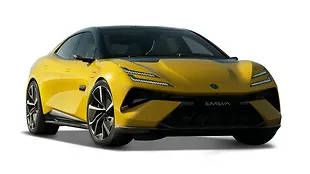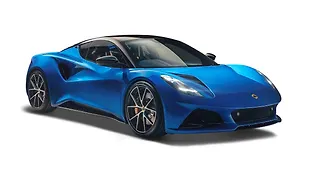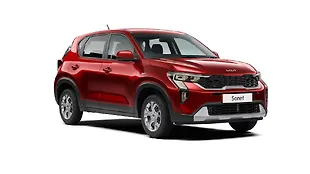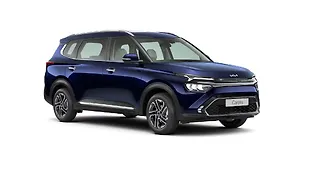Why would I buy it?
- Driving convenience
- Strong performance
- Practicality
Why would I avoid it?
- Not a proper automatic option
- Not available in GT variants
What is it?
7.5 / 10
This Kia Seltos iMT version is currently the only diesel SUV configured with an iMT (intelligent manual transmission). Last year, we detailed its petrol-powered iMT version and are now sampling this diesel-iMT, which currently replaces its manual counterpart. The comfort and convenience it offers with clutchless gearshifts while packing the performance and tractability of a diesel car are interesting. Let's delve into the details.

This is the HTK+ version, and it is worth mentioning that Kia now offers the iMT even with the HTX+ variant. So even if the basic design of the two remains the same, the styling elements are a bit different. For example, the projector and DRL setup in the HTK+ gives the vehicle a different look than LED lighting in HTX+. Similar is for these alloys as against the dual-tone 17- or 18-inch wheels. Nonetheless, the stance and brute look of an SUV are carried over in all trims.
Is the cabin of the Seltos iMT any good?
7.5 / 10

Inside, the story about the cabin is similar to that of the petrol iMT HTK+ version we reviewed earlier. However, with the iMT now being available with a higher-spec HTX+ version, we shall tell you the basic similarities and differences. Starting with space and comfort, both are the same and offer a good room and a relaxed seating position. The rear bench lacks a little under-thigh support, but one has enough space to stretch their legs. A change with this lower trim is in terms of convenience. This HTK+ offers manual adjustments as against the HTX+'s electrical adjustments. Here, the latter has rear armrests with cup holders and a 60:40 split seat, whereas the former misses both.

Even when it comes to the feel and quality of materials, do note that the HTK+ offers only a black single-tone interior with light-coloured fabric seats that are prone to get soiled soon. The leatherette seats, which the HTX+ receives, are far more premium and easier to maintain. Then, the top-spec trim also gets front ventilated seats, a fully-digital instrument cluster, a 10.25-inch infotainment screen instead of an eight-inch one, a GPS navigation system, eight speakers instead of six, a wireless charger, vanity mirrors with lights, and scuff plates. Thankfully, there is no cost-cutting on the safety front, and all variants get six airbags, TPMS, ABS, EBD with brake assist, and ESP. Moreover, the top-spec trims sport hill-hold assist, traction control, telematics, adjustable headrests, a 360 camera with front and rear sensors, auto headlamps, cornering lamps, rain-sensing wipers, and more.

Is the Seltos iMT nice to drive?
7.5 / 10

The diesel Seltos is powered by a 113bhp 1.5-litre engine, which, for the first time, comes mated to a six-speed iMT. We have seen this gearbox in its petrol-powered sibling, and now list its benefits in this combo without a clutch pedal. Just step on the brake pedal and start the car in neutral. This is a refined unit for a diesel motor and doesn't even produce pronounced vibrations on the gear lever or the steering. Since there's no clutch pedal, you just slot in the first gear and release the brake pedal whenever you're ready to go. As the car starts creeping ahead you keep increasing the throttle inputs and shifting to a higher gear all by yourself. But unlike an automatic, whenever the revs build, you need to release the throttle and shift to a higher gear. Similarly, shift down to a lower gear upon reducing speeds. This might sound like a task for people driving conventional automatics but is a boon for all drivers.

How you may ask? Firstly, for drivers used to a manual gearbox, your left leg is relieved from the clutch pedal operation. The gears slot in well, there are no jerks while shifting gears, and the process is smooth. Besides, unlike fully automatic cars, the iMT here provides you full control of shifting gears or whichever gear you want the car to be in. This helps when you are making a quick overtake or taking a corner. Only when you are close to the rev limit or want to shift up aggressively, you’ll figure there's a slight delay before you tap out the throttle and change gear. Otherwise, with its smooth shifting, the car doesn't even coast as it would with a clutch pedal engaged. Also, if you're in the wrong gear, it beeps and the instrument cluster suggests the right gear to be in, without stalling the car. So in traffic snarls, just be in the second gear, while modulating the accelerator and brake pedal. It proves to be useful in bumper-to-bumper traffic and even for learners. That said, we still feel having hill-hold assist as standard across the variants could have made its case even stronger.

Besides, all of this ease is paired with good drivability and fuel efficiency. Sure, the SUV does take a fair bit of time to build speed, and a 0-100kmph sprint was achieved in 13.6 seconds. Still, the roll-on tests of 20-80kmph in third gear in 8.68 seconds and 40-100kmph in fourth gear in 10.24 seconds are good for a car weighing 1,310kg. This can also be attributed to the 250Nm of ample torque that helps in keeping the engine at low revs, yet keeps the car going. For instance, you could cruise in around the sixth gear at 60kmph and rev slightly above 1,200rpm. Similarly, you can do 80kmph at around 1,500rpm and 100kmph close to 2,000rpm. Our tested fuel-economy figures are also impressive with an average of 19.15kmpl (city- 17.59kmpl, highway- 20.71kmpl) lending it a practical driving range of 957km.

Likewise, its ride and handling are still nicely balanced with the iMT version offering light controls, therefore making it easy to drive. We would have loved to have more feel and feedback from the steering, which is light and does weigh up with speed. Still, it isn't cumbersome while parking and confidently steers you in and out of a corner. Its body roll gets evident but is well-contained as the SUV grips onto the road even upon hard braking. Then, the all-disc brakes with nicely tuned ABS do a fair job of stopping the car. Furthermore, the suspension doesn't feel busy on highways and doesn't smother bad roads. However, it complies with our road conditions, and the 16-inch wheels on this iMT version take sharp-edged potholes without any fuss. Be it the city or the highway, this Seltos iMT still makes so much sense.

Should you buy the Seltos iMT?
7.5 / 10

The top-spec Kia Seltos HTX+ variant retails close to Rs. 21.34 lakh, on-road, Mumbai, while the HTK+ version costs Rs. 18.37 lakh, on-road. The latter packs in most of the essential features adding value at its price. Yet, if one wishes to opt for all the bells and whistles, Kia has the other offering but not in the unique GT versions. Nevertheless, the Seltos is presently the only mid-size SUV in India to be sold with a diesel-iMT configuration. A diesel model is anyways more fuel-efficient and helps reduce running costs, and now, this dual-pedal setup slashes off all the efforts of your left leg to press a clutch. It indeed is a worthy option to consider for someone who wants this convenience without splurging a premium for a proper automatic.

Pictures by Kapil Angane

![Kia Seltos BS6 Phase 2 [2023-2023] Right Front Three Quarter Kia Seltos BS6 Phase 2 [2023-2023] Right Front Three Quarter](https://imgd.aeplcdn.com/642x361/n/cw/ec/148023/kia-seltos-right-front-three-quarter0.jpeg?isig=0&wm=1&q=80)
![Kia Seltos BS6 Phase 2 [2023-2023] Right Front Three Quarter Kia Seltos BS6 Phase 2 [2023-2023] Right Front Three Quarter](https://imgd.aeplcdn.com/642x361/n/cw/ec/148023/kia-seltos-right-front-three-quarter3.jpeg?isig=0&wm=1&q=80)
![Kia Seltos BS6 Phase 2 [2023-2023] Right Side View Kia Seltos BS6 Phase 2 [2023-2023] Right Side View](https://imgd.aeplcdn.com/642x361/n/cw/ec/148023/kia-seltos-right-side-view7.jpeg?isig=0&wm=1&q=80)
![Kia Seltos BS6 Phase 2 [2023-2023] Right Rear Three Quarter Kia Seltos BS6 Phase 2 [2023-2023] Right Rear Three Quarter](https://imgd.aeplcdn.com/642x361/n/cw/ec/148023/kia-seltos-right-rear-three-quarter5.jpeg?isig=0&wm=1&q=80)
![Kia Seltos BS6 Phase 2 [2023-2023] Right Rear Three Quarter Kia Seltos BS6 Phase 2 [2023-2023] Right Rear Three Quarter](https://imgd.aeplcdn.com/642x361/n/cw/ec/148023/kia-seltos-right-rear-three-quarter13.jpeg?isig=0&wm=1&q=80)
![Kia Seltos BS6 Phase 2 [2023-2023] Rear View Kia Seltos BS6 Phase 2 [2023-2023] Rear View](https://imgd.aeplcdn.com/642x361/n/cw/ec/148023/kia-seltos-rear-view15.jpeg?isig=0&wm=1&q=80)
![Kia Seltos BS6 Phase 2 [2023-2023] Left Rear Three Quarter Kia Seltos BS6 Phase 2 [2023-2023] Left Rear Three Quarter](https://imgd.aeplcdn.com/642x361/n/cw/ec/148023/kia-seltos-left-rear-three-quarter4.jpeg?isig=0&wm=1&q=80)
![Kia Seltos BS6 Phase 2 [2023-2023] Left Side View Kia Seltos BS6 Phase 2 [2023-2023] Left Side View](https://imgd.aeplcdn.com/642x361/n/cw/ec/148023/kia-seltos-left-side-view6.jpeg?isig=0&wm=1&q=80)
![Kia Seltos BS6 Phase 2 [2023-2023] Image Kia Seltos BS6 Phase 2 [2023-2023] Image](https://imgd.aeplcdn.com/272x153/n/cw/ec/144159/seltos-exterior-right-front-three-quarter.jpeg?isig=0&q=80)

























